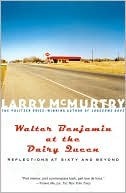More on this book
Kindle Notes & Highlights
The aridity of the small west Texas towns was not all a matter of unforgiving skies, baking heat, and rainlessness, either; the drought in those towns was social, as well as climatic.
People on their way to Abilene might as well be on their way to hell—why talk to them? Folks in Archer City knew the way to hell well enough; they need seek no guidance from traveling men.
The decline of whittling, which is the slow paring away of a stick, usually for no purpose other than to occupy the hands, has clearly deprived storytellers of many willing listeners—
My question to Walter Benjamin would be, what kind of stories arise in a place where nothing has ever happened except, of course, the vagaries and vicissitudes of individual life?
(These whittling cowboys, their hands occupied but their minds in neutral, were, in Benjamin’s terms, perfect receptacles for stories, though often, no storyteller being available, they were wasted receptacles.)
Stay in one place long enough, or return to the same place often enough, and some interesting ironies are likely to accumulate.
The media not only supplies us with memories of all significant events (political, sporting, catastrophic) but edits those memories for us too. Anyone who has ever taken part in a large public demonstration—a civil rights march, a war protest—and then gone home to see the same demonstration as reconstructed by television will know what I mean. What to the participant may seem merely an inchoate surging of masses of people will look, on television, ordered and effective,
as I was attempting to explain why I liked to drive back and forth across America on the interstates, I suddenly realized that I hadn’t escaped cowboying at all. What was I doing, proceeding north on I-35, but driving the trucks and cars ahead of me up to their northern pastures? My driving was a form of nomadism, and the vehicles ahead of me were my great herds.
What rodeos, movies, Western art, and pulp fiction all miss is the overwhelming loneliness of the westering experience.
almost at the outset cowboys began to try to cultivate an image that the media told them was theirs—they began to play to the camera as soon as the camera was there,
determines. In the West lifting up one’s eyes to the heavens can be a wise thing, for much of the land is ugly. The beauty of the sky is redemptive; its beauty prompts us to forgive the land its cruelty, its brutal power.
When a sky as vast as that over the Oklahoma Panhandle wears its foreboding aspect, lightness of spirit is not easily cultivated.
how many centuries of settled urban experience does it take to produce a Proust or a Virginia Woolf?
Writers weren’t needed, in quite the same way, once the camera came.
The great readers will always know about books that neither the marketplace nor the academy has got around to.


